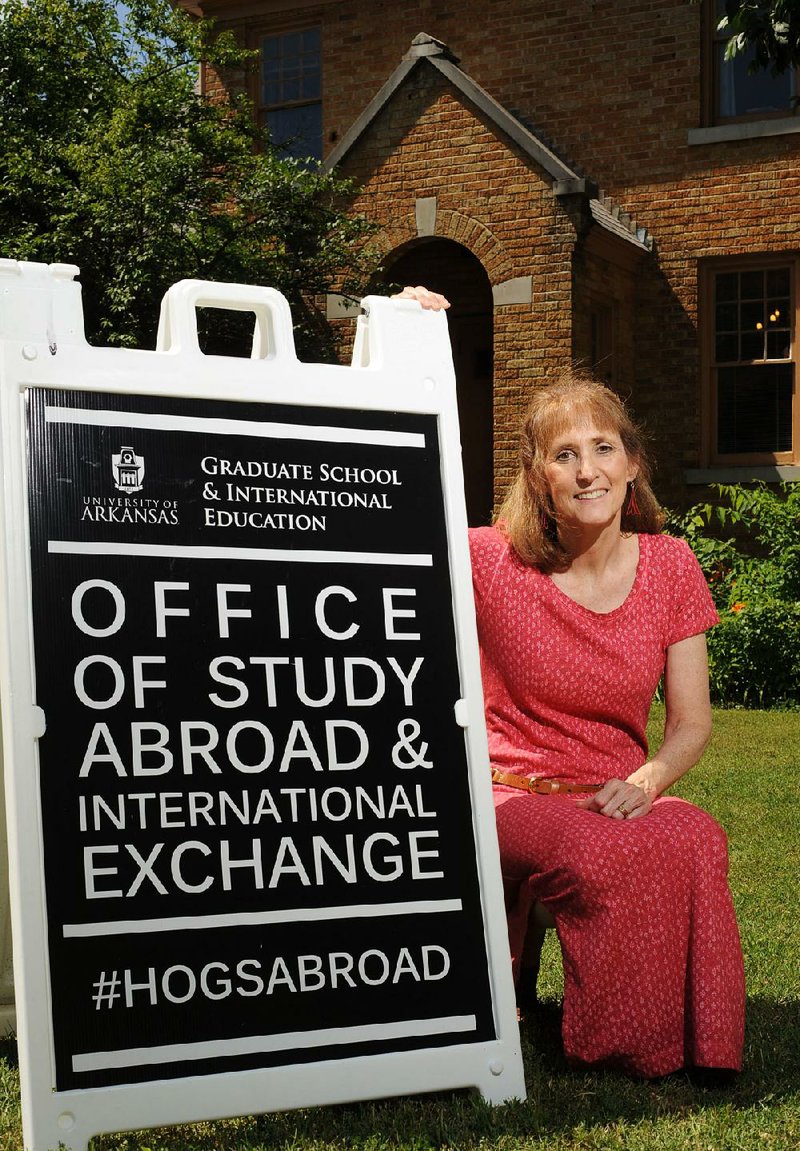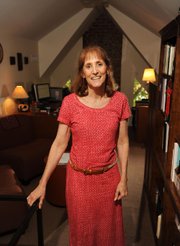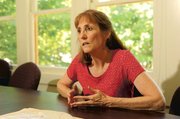FAYETTEVILLE -- DeDe Sargent sat at a vanity in her Scotland dormitory at the University of Edinburgh, brushing her long red hair and staring past the mirror.
Cynthia Calvin, her childhood best friend, had come in from the University of Kent in England, and sat at the edge of the bed. DeDe's boyfriend, Bo Long, waited outside. Although it was only November, the middle of the academic year, it was time to go back home.
DeDe's father was terminally ill and her family needed her. She'd have to cut short her study-abroad year. As a student of a liberal arts college in the early 1970s, her international travel was more than a vague inclination. More like a lifelong dream.
"I was eager as a college student to go abroad," Long says. "I didn't realize how few college students went at the time because it was something I'd always wanted to do."
As a student of Bowdoin College in Maine, DeDe thought the system seemed a little rigged. The elusive year abroad was operated by an outside organization and the college administration wasn't jumping to lose a year's tuition from their brightest students. But DeDe was determined.
Her options were few: the United Kingdom or Germany and France. Not having a foreign language under her belt, she chose the U.K. Once there, she surrounded herself with other exchange students. German, Pakistani, Iranian -- for the first time, she saw the world through everyone else's eyes. And she saw herself as an American.
"When you set yourself up to love something, you love it," she says from her office as director of the Office of Study Abroad and International Exchange at the University of Arkansas. "That's what we try to do. We set their expectations for having it be wonderful and it typically is."
Long recently returned from chairing the NAFSA: Association of International Educators conference alongside speakers Caroline Kennedy, Malcolm Gladwell and Shiza Shahid, co-founder of the Malala Fund (the organization representing Malala Yousafzai, the Pakistani teenager shot and wounded by the Taliban for wanting girls to go to school).
"She was so humbled by the tremendous amount of attention the [association] convention brought her," says lifelong friend Cynthia Calvin. "She got to sit on stage with [these speakers] and was in awe of them, but she was one of them.
"I don't think she recognizes the enormously positive impact she has on such a large community."
When she arrived at the University of Arkansas in 1978, incoming international students and Arkansans hoping to study internationally had to go through the registrar's office. It wasn't until 1990 that a study abroad office began, and unofficially at that. Since it became more centralized in 1993, Long has helped more than 10,000 students earn international education in what's often a perspective-altering trip.
"DeDe has that kind of interest in others and a particular kind of empathy that's a critical element of international education," says Hoyt Purvis, professor of journalism at the University of Arkansas and a mentor. "Before DeDe, there was not a whole lot dedicated to study abroad [at UA]. She saw it needed to be taken to a higher level."
What she didn't anticipate during her own experience abroad was to have two very compelling reasons to stay home -- the death of her father, and falling in love with the man who would become her husband.
"I didn't expect to have my heart pulled back in the U.S.," she says. "I was mad that I met someone I cared that much about because I was just so ready to have my year abroad.
"But I wasn't going to let it stop me."
A HOME, NOT A HOUSE
From the beginning, the University of Arkansas study abroad office has grown up in the McNalley House -- a brick cottage on the northeast edge of campus. It's homey, and that's what Long loves.
"I used to say, 'When the house goes, I'm done,'" Long jokes. "There isn't anything architecturally special about it, but it's important to so many people. [Students] like coming in to a place that seems like a home."
Keeping the cottage as the hub of the land grant university's international travel has paid homage to its humble origins, its grassroots start. Students walk in the McNalley House, are greeted with Long's hospitality and soon find themselves stepping off a plane into their very own adventure.
Long's own house has been a home of sorts for the hundreds of exchange students who come to Arkansas, attending all manner of barbecues, marshmallow roasts and dinners as an introduction and welcome to the American way of life.
"DeDe has opened her home to countless international students and visiting international scholars year after year," says friend Beth Barham. "She's helped many a student and family through crises that arise when people are out of their own country context.
"She believes passionately that few things can have as much impact on a life as learning firsthand about other cultures."
Thirty years ago, the students who traveled internationally were typically white, affluent liberal students who had a junior year abroad to study. People, Long says, like herself. International education has since exploded into internships, service learning, short-term language immersion, research projects and exchange programs.
Long's entire career has been set on that evolution.
"We are the happiest office on campus, I'm pretty sure," Long says. "The students want to come in and they want to go abroad and we let them, we help them figure it out. When they come back, they've had this amazing experience and they attach us to that, so what's wrong with that picture? It's perfect."
SWEETNESS AND GRIT
It was nostalgia that led the Longs to the Ozarks, remembering Bo's childhood of floating the Buffalo and hiking the abundant forests. Fayetteville seemed like a good place to put down roots.
Thinking she'd find work while studying, DeDe was told her degree in comparative religion could get her two things: a gig waiting tables or a seat in the classroom. From a family that valued education and intellectual conversation (father a Yale alumnus; mother, Vassar College), she knew she would have a good career if she could align herself with a university.
Long entered the master's in higher education program at the University of Arkansas and found her specialty through a survey class that hosted a variety of speakers from all parts of campus.
The financial aid director spoke. Nope, she thought.
The housing director spoke, but back then you had to live in the halls with the students.
Then Ron Moffatt, the foreign student adviser, came.
"He starts telling us about his work and I was completely taken," Long says. "You're working with foreign students from all over the world. How could you get any better than that? I just couldn't believe I found it out."
Moffatt took primary responsibility for getting 500 international students situated each year and was finally allowed to hire a graduate student to help alleviate the workload.
"Ding! I followed him out of the classroom and I didn't want to let him go until he gave me the job."
Long had found one of only two people on campus who had a job in international education. Given a little time, she found the other, Bruce Kellar, an associate registrar who was in charge of foreign student credential evaluations. There were rumors of his retirement, and DeDe rushed in to secure an internship.
"She is really bullheaded," Bo Long says. "If she wants something, she's probably going to get it. The things she thinks are important, she'll go to bat for."
Over the years, he has seen that at play with her work in international education, with raising her children and having a powerhouse presence in volunteering for various arts and education organizations, particularly The New School. He credits her success to a "combination of sweetness and grit."
"DeDe's incredibly kind and it flows out of her," he says. "She's always thinking of the other person and how they might be comforted and get along in life better."
By the end of the year, when Kellar did indeed retire, Long was the most knowledgeable source for foreign credentials on campus. The University of Arkansas was gearing up to open a formal office of international admissions, and at age 26, Long became its first international admissions officer.
A few years into being a navigator for foreign students, DeDe and Bo started their family when she gave birth to their son, Taylor. She trained someone else for the UA job, and left.
THE PRETZEL OF FATE
A year and a half later, Long was running at the university track when Dr. Tom Westing, director for international agricultural programs at the university, joined her. She'd kept volunteering on committees, but hadn't explored ways to return just yet. The agricultural college had just received three grants for exchange programs and faculty research projects in Burundi, Rwanda and Haiti. By the end of the jog, she was offered the job.
Long spent a few years developing special programs before leaving to have her daughter, Molly.
Never one to sit on her hands, Long got wrapped up in the Sister Cities program and was strengthening a partnership with Santiago, Dominican Republic, when there was another twist of fate. Moffatt, her longtime mentor in international education, took a position in San Diego.
"It was like magic," she says. "How can you live in this cute little town, raise kids like Leave It to Beaver and work with people from all over the world?"
Her end goal, though, was to help American students go abroad. A year and a half into her volunteerism, she called Hoyt Purvis, then director of the Fulbright Institute of International Relations.
Long figured she could earn a doctorate and conduct research in international education through the Fulbright papers made available by University of Arkansas Libraries Special Collections. Or she could go to work streamlining the faculty-led study abroad programs and facilitating new ones.
Little did she know the Roy and Christine Sturgis Charitable Trust Foundation had awarded a sizable endowment to make study abroad a requirement for the UA Honors College. Before Long knew it, she was in the basement of the McNalley House, surrounded by 10 boxes and thinking, "Now what do I do?"
STAGE MANAGER
With much international travel come delays and reroutes, lost luggage and stolen or missing valuables and sometimes sickness or even hospitalization. From the beginning, Long was mission control.
Having a troubleshooter at the touch of a button has made countless trips smoother and set faculty, student and parent minds at ease.
In traveling "people fall ill, get lost, lose important documents and DeDe is something of a crisis queen," Barham says. "She's able to fix the most dire problems, sometimes through sheer determination."
Long inherited a handful of faculty study-abroad programs, including Theater in London and Business in Europe. It was clear that faculty were the key to getting more students engaged in travel-learning, but there were no consistent procedures. Whether they would go as planned from year to year was hit or miss.
In expanding the programs, Long searched endlessly for more resources to develop the study abroad office, more faculty willing to lead, more scholarships and grants for students and ways to transfer class credits from the programs. Long sought partners, and found them at other campuses through NAFSA.
"Nobody from the top said, 'Build this big study abroad program,'" she says. "There was a need ... I wanted students to be able to have a choice. I wanted them to be able to go where their heart was telling them to go."
Named 2012 NAFSA (formerly National Association for Foreign Student Advisers) Advocate of the Year and also awarded the association's "Outstanding Service to International Education" plaque, Long managed to articulate her desire for a more peaceful, loving world in a constructive way, despite changes to the field in the past three decades.
"There are a lot of things expected now in the profession that those of us who started back in the '70s, we made up as we went along," she says.
Now there are formal offices, structured expectations and standards. From the generation that largely experienced other countries by way of the Peace Corps, she says, "I know it sounds crazy ... but we all did want world peace. We really believed that if people knew each other, they wouldn't shoot each other."
High Profile on 07/26/2015




